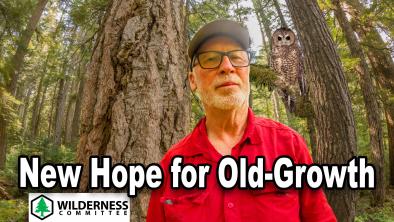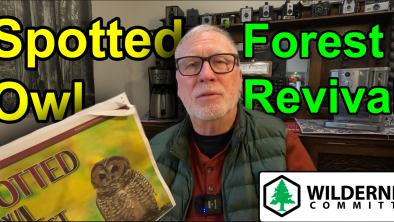Delay in logging old-growth area helps endangered spotted owls in southern B.C. — for now
CBC
A one-year reprieve has been given to one of Canada's most endangered species
An agreement to delay logging of an old-growth stand of British Columbia forest has given a one-year reprieve to one of Canada's most endangered species.
But governments now have to come up with a permanent way to protect the vanishing spotted owl and other endangered species in the province, said Kegan Pepper-Smith of Ecojustice, which has been pushing the federal government on the issue.
"We need to reimagine an approach that protects [species] and their habitat with legally enforceable measures.''
Just a tiny handful of spotted owls remain in the Canadian wild. Some estimates place the remaining population in the forests around Spuzzum in south-central B.C. as low as three.
On Thursday, B.C., the federal government and the Spuzzum First Nation announced a deal to hold off logging that watershed for a year while the governments continue working on a recovery plan for the owls.
'Steep decline in biodiversity'
"One thing that I think Canadians don't fully appreciate is how steep the decline in biodiversity has been in this country, and around the world," said federal Minister of Environment and Climate Change Jonathan Wilkinson.
"There are many species that used to be abundant that are on the verge of extinction today. Certainly the spotted owl is a great example in that regard," he said.
The logging deferral is part of a larger deal the two governments are developing to help the province preserve biodiversity.
"These first pilot projects will strengthen habitat protection for the threatened species which depend on it, such as the spotted owl, and help build a systemic approach to protection of biodiversity," B.C. Environment Minister George Heyman said in a release.
B.C. has a captive breeding program that now has 28 spotted owls whose offspring will be released into protected habitats.
Pepper-Smith called the deal encouraging, but said both Ottawa and the province have a long way to go before the medium-sized, dark brown owl is fully protected.
"[Critical] habitat has never been identified," he said. "How can they say they've protected habitat if they've never appropriately defined it?"
B.C. claims about 281,000 hectares of protected spotted owl habitat. Pepper-Smith disputes that, saying much of that land is subject to logging.
"The B.C. government's definition of protection is by no means sufficient," he said.
Pepper-Smith said the one-year harvesting deferral should result in a clear plan.
"We would like to see the updated recovery strategy published with a clear identification of the owl's critical habitat and measures in place on how to protect that habitat," he said.
Ecojustice would also like to see progress on the so-called Nature Plan between the two governments, with clear identification of the most important habitats. Pepper-Smith points out that B.C. has more endangered species than any other province, adding Thursday's announcement is a good start.
"There's some hopeful language," he said. "There's discussion of pilot projects and funding and moving forward on a pan-Canadian approach to transforming species-at-risk protection and conservation."
With files from Yvette Brend.


